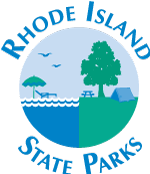Dame Farm History (1969)
The acquiring of the Dame Farm on Brown Avenue in Johnston as part of the Snake Den State Park occurred when there was considerable concern that farmland was quickly transforming into suburban house lots. Observers of the public scene were more than apprehensive about the loss in agricultural land use in the 1960s. The loss of farms meant not only a loss of open space, but also the passing of a way of life going back to the origins of Rhode Island, the life of the family farm.
The purchase of the Snake Den farm and woodlands in 1969 was an opportunity to save a family farm with a heritage dating back to 1789 and also to set aside open space for recreation and environmental purposes. The open space program which permitted this was the Green Acres program, a popular program of the Chafee administration which was keenly aware of environmental issues which first appeared in urgent form in the 1960s.
At first it seemed that the run-down condition of the farmstead would not lend itself to preservation and active use, but a new non-profit organization, known as R.I Historical Farm, Inc., appeared and appealed to the then Department of Natural Resources (the forerunner of DEM) to allow it to manage the farm as a subset of the larger Snake Den park lands. Within a year (1970-1971), RI Historical Farm had sublet the running of the farm back to its original owners, the Dame family, and sought out the possibility to have the property placed on the National Register of Historic Places so as to be eligible for grants to restore the buildings of the farm. The early members of this grass roots movement were interested in local history and ecology. The latter people drew from other organizations like Ecology Action and the Audubon Society.
As they proceeded to attract grants for repairs and restoration as well as devising public programs, the group strove to portray a family farm as a period piece of the 1930s. It began to collect suitable artifacts; it was in touch with Sturbridge Village, and obtained farm implements on loan.
The energetic efforts of this group, the drive to get on the National Register, and the implications for the rest of the park development created initial frictions with competing park Federal funding sources, like the Bureau of Outdoor Recreation. Dame Farm and its supporters had good momentum going by the time the master planning was completed for the over all park. Some of those plans called for damming the Pocasset River to create ponds and a lake, making a series of playing fields and courts, and facilities to support a wide range of recreational activity: biking, baseball, fishing, boating, horse-back ridding, sledding, skating, picnicking. These plans called for considerable landscaping. The proposed facilities that would be in view to visitors at the historic farm site were deemed to be incompatible with the historic setting. Such developments were at odds with National Register of Historic Places rules. Dealing with, and resolving, these issues engaged various state agencies and the town of Johnston most of the decade of the 1970s.
In the end, however, the basic direction of the Dame Farm was determined by the Town of Johnston, and its citizens, who voted to limit the development of the park to be mostly undeveloped open space. By the mid 1980s the Historic Farm group brought 20,000 people annually to its events. Since 2000, however, RI Historic Farm, Inc. is less active in the farm’s affairs. Today, the main public attraction of the area is the operation of the farm under the management of the Dame family.
Throughout the 1970s and 1980s, the Dame family focused on a breeding program for heifers and a growing program of sweet corn, silage corn and apples for the wholesale market. The recent focus, however, has been a farm stand operation directed to the retail market. Although operated under an arrangement with the state, the family no longer depends on the programs and grants of RI Historic Farm, Inc., or any state support. From the standpoint of the family, it is a true family farm.
